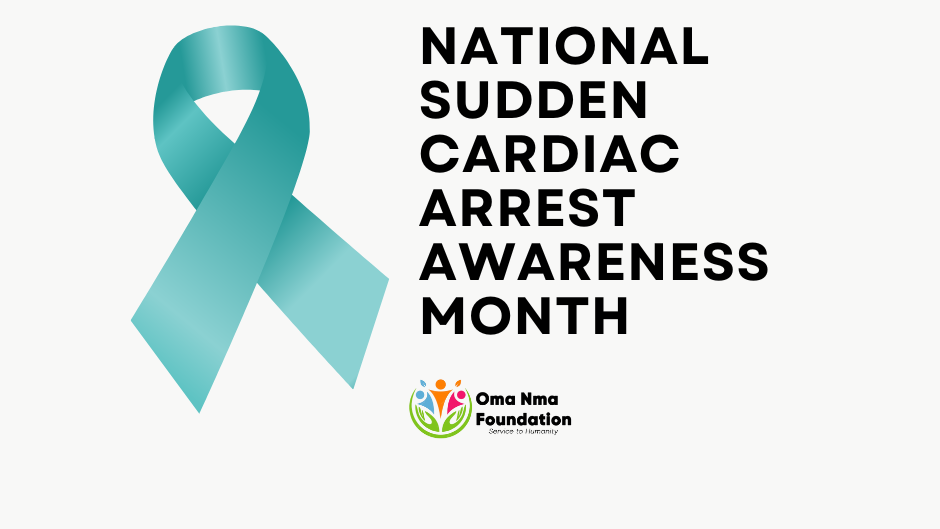
Use Heart for Action
October is Sudden Cardiac Arrest Awareness Month, designed to inform the public about warning signs, risk factors, and what to do in a cardiac emergency. This global initiative is designed to increase awareness about the importance of knowing what to do in an emergency and learning Hands-Only CPR in hopes of saving lives by increasing the rate of bystanders getting involved and giving CPR to someone who needs it.
Sudden Cardiac Arrest (SCA) is not a heart attack. A heart attack is caused by impeded blood flow through the heart. SCA is caused by a structural or electrical problem, often from an undetected heart condition, and in other instances, from an infection or a severe blow to the chest.
While society cannot authoritatively confirm the exact cause of death in these situations without prejudice, we owe it a duty to call the attention of Nigerians to the very possibility that sudden death can often occur either in the presence/absence of risk factors many of which are highly prevalent among Nigerians and are also poorly controlled.
Sudden death is defined as a natural, unexpected fatal event occurring within 1hour from the onset of symptoms, in a healthy subject, or in one whose disease was not so severe to predict such an abrupt outcome.
Sudden death is defined as a natural, unexpected fatal event occurring within 1h from the onset of symptoms, in a healthy subject, or in one whose disease was not so severe to predict such an abrupt outcome.
Sudden cardiac death can be defined as death resulting from abrupt loss of cardiac function with or without previous heart disease unexpected within 1 hour of onset of symptoms. About 50% of ALL deaths from heart diseases are sudden regardless of the etiology. It has also been shown that 89% of all sudden cardiac deaths occur outside the hospital and less than 40% are witnessed.
The causes of sudden death are as varied as their presentation. They include complications of hypertension, heart attack, stroke, heart failure, cardiomyopathies, valvular disorders, pulmonary thromboembolism, aortic aneurysms, status epilepticus, inherited arrhythmogenic channelopathies (including long QT syndrome, Wolf Parkinson White Syndrome, familial Brugada syndrome and short QT syndrome).
The risk factors for heart disease are many. The most common, and by far, the important ones are related to lifestyle such as lack of physical exercise, smoking tobacco, consuming alcohol, eating unhealthy diets rich in salt and saturated fats, and low in fresh fruits and vegetables. Other risk factors include high blood pressure (hypertension), high blood lipids/cholesterol (dyslipidemia), overweight and obesity, and diabetes mellitus. Hypertension is the most common risk factor for heart disease and stroke in Nigeria. Sadly, three out of every ten adult Nigerians have high blood pressure, many of whom are unaware of their hypertensive status. Effective blood pressure control is a major panacea for reducing the cardiovascular risk of affected people. More sadly, only about 7% of hypertensive subjects have been shown to achieve effective blood pressure control in Nigeria and other sub-Saharan African countries.
Several reports have documented a very high prevalence of many cardiovascular risk factors including obesity, metabolic syndrome, smoking including passive smoking) drug abuse (recreational drug use), alcohol intake, and physical inactivity among Nigerians. The risk of sudden death varies with the cardiovascular risk factor, the severity of the disease, genetics, and other precipitating factors among which may be acute stressful reactions to which the link with these recent deaths can be associated.
It must be emphasized that many of these cardiovascular risk factors are without symptoms and signs. Therefore, screening is the only effective mechanism for early identification and appropriate control and prevention of sudden death among the populace.
The untimely deaths of these Nigerians are a stark reminder that we must be vigilant about our cardiovascular health. Sports and other emotional events can trigger arrhythmias, heart attacks, and strokes in those with underlying heart conditions.
We urge all Nigerians to learn the warning signs of cardiac distress and how to respond in an emergency. Know your family history and risk factors and get regular screenings. Take steps to manage conditions like hypertension, high cholesterol, and diabetes. Avoid smoking, eat healthy, exercise, and manage stress.
For those with heart disease, take medications as prescribed and follow your doctor’s advice. Avoid getting overly excited during games and take breaks as needed. Have emergency numbers handy and do not hesitate to call for help. Better to miss a play than miss a life. Warning symptoms preceding a sudden death may include Chest pain, breathlessness, nausea, vomiting, dizziness, and fainting attacks. It should be noted that left-sided chest pain should not be taken with levity and should warrant a medical examination.
With preventive care and caution, we can still cheer on our teams while safeguarding our health. We call on all Nigerians to look out for one another and promote heart-healthy lifestyles. Together we can honor those we have lost by preventing similar tragedies in the future.
We use this medium to call on the government to increase the funding for health to encourage early and regular screening for cardiovascular risk factors. There is also an urgent need for institutionalizing effective cardiovascular care among Nigerians by providing adequate facilities for the hospitals, encouraging adequate remuneration for health workers to discourage brain drain in the health sector, and promoting effective lifestyle modification to reduce the burden of cardiovascular disease among the population.
